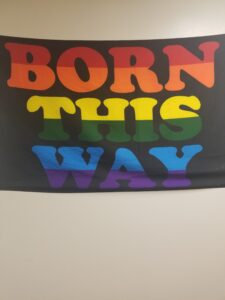
Photo Submitted by Isis Climes
Homophobia in the black community is always a trending topic.
The black community seems to be torn between supporting individuals in the LGBTQ community or scorning them for their lifestyles.
Hyper masculinity and religious beliefs rooted in the black church plays a major role in stimulating disdain toward black individuals in the LGBTQ community.
The rapper Lil Nas X was recently in the social media hot seat after he was questioned for coming out on an episode of HBO’s “The Shop: Uninterrupted.”
According to Charles Holmes’ “Lil Nas X Discusses Coming Out After Intense Line of Questioning From Kevin Hart” on Rolling Stone, the comedian Hart and marketing executive Paul Rivera questioned Nas on why he felt it was important to “make an announcement” — referring to his tweets during the summer.
Although a tremendous amount of support was given to Nas, there also was backlash and comments questioning his motive for the announcement. Nas came out on Twitter on June 30, according to Now This’ article “Lil Nas X Reveals He’s Gay on the Last Day of Pride.”
“Some of y’all already know, some of y’all don’t care, some of y’all not gone fwm no more,” tweeted Lil Nas X.
As a minority group constantly antagonized and alienated in issues such as police brutality, unequal opportunities, etc., I believe black people should work toward unification in our community. Our ultimate goal should be setting aside our differences to achieve equality and acceptance within our group.
Rather than alienating homophobes in our community, I believe they should be taught how to become more inclusive on accepting those in the LGBTQ community. Every moment should be a teachable moment — learning how to become more inclusive in the community would be proactive in creating safe spaces and unifying the community.
The task of educating homophobes should not be solely placed on those in the LGBTQ community, because this could inherently create violent situations. If the unification of black people is at risk, all black people need to have a hand in pushing for change.
The narrative of black masculinity is strongly tied to manhood and seen as a guidebook detailing strict behavioral methods on what a man is and what a man is not. Being seen as a gay male in the black community is automatically considered not aligning with these conceptual ideas.
FAMU pre-nursing junior Maya Wilks notices the divide in the black community when it comes to homosexuality and believes the topic shouldn’t hold such a negative connotation.
“I feel like it (homophobia) has caused a cold form of division and hatred among people who have the greatest responsibility of staying united. With every evil act, senseless crime and unjust consequences that we face in and out of our black community, homosexuality is the least of our worries,” said Wilks.
Religious teachings from churches and holy texts, such as the Bible, play a major role in shaping viewpoints on the topic of homosexuality — especially in the black community. I believe that with any religious efforts, the motive should be to uplift and inspire individuals for the betterment of their lives — not to discourage a person’s lifestyle.
“It messes with the world when anger and disgust from one individual to another is iterated because of their own life choices,” said Wilks. “We have to separate spreading negativity from following the guidelines of the religion. Too many people are focused on others’ path to righteousness and not their own.”
For the black community to become truly unified, the community has to learn how to not only advocate for equality within our community, but become accepting of others, even if their lifestyles do not match our beliefs.